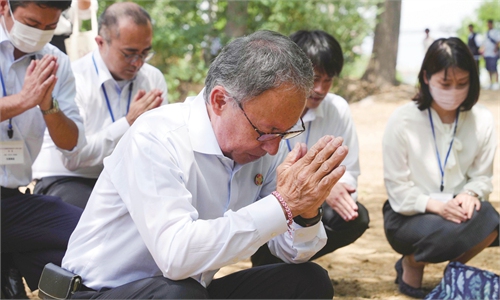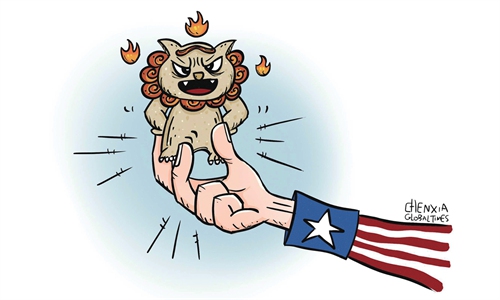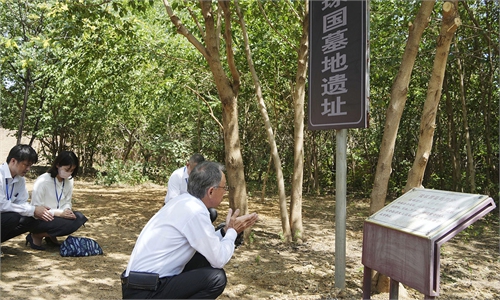ARTS / CULTURE & LEISURE
Civilian group from Okinawa visits Ryukyu cemetery site in Beijing, expresses hope for peace
Enduring ancestral ties
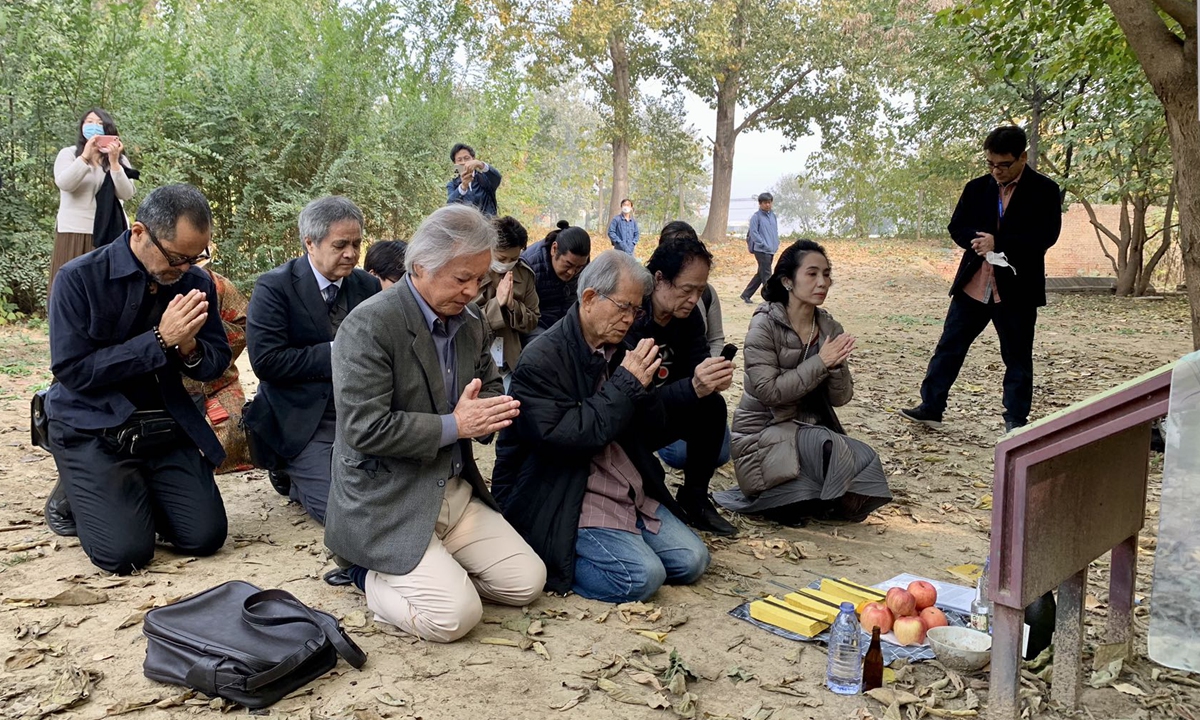
A group of scholars, musicians, and writers from Okinawa pay their respects at the Ryukyu Kingdom cemetery in Tongzhou district in eastern Beijing on October 30, 2023. Photo: Xing Xiaojing/GT
A group of scholars, musicians, and writers from Okinawa on Monday visited the Ryukyu Kingdom cemetery located in Tongzhou district in eastern Beijing to pay their respects, marking the first visit by a civilian group from Okinawa to the graveyard since Okinawan Governor Denny Tamaki's visit in July this year, with some in the visiting group expressing hopes to collaborate with China in extending peace throughout Asia.At the cemetery, members of the visiting group offered incense, paper money, and local specialty liquor as libation and offerings to their ancestors.
A deep historical connection
Renowned Okinawan musician Shoukichi Kina played the Sanshin, a traditional Okinawan instrument, while singing "Tinsagu nu Hana," an Okinawan folk song about traditional Ryukyuan values and other Confucian teachings in Central Okinawan. The Chinese version of this song, entitled "Hua Xin" sung by Wakin Chau, a singer from the island of Taiwan, is widely known in China.
"I am deeply moved," Kina told the Global Times. This is his first visit to the Ryukyu Kingdom cemetery, a visit that will hopefully allow him to fully appreciate the experiences of those laid to rest there. The reason why the song "Hana," rich in elements of Ryukyu culture, is loved by the Chinese people is probably because ancient Ryukyuan and Chinese peoples shared a deep historical connection.
The Ryukyu Kingdom graveyard is located near Lichan'an village, Zhangjiawan township. In the Ming Dynasty (1368-1644) and Qing Dynasty (1644-1911), Zhangjiawan was an important wharf of the Beijing-Hangzhou Grand Canal and an entryway into Beijing from other regions.
A blue sign which reads "Ryukyu Kingdom Graveyard Ruins" 100 meters from farmland announces the exact location of the historical site. A brief introduction on the sign notes that 14 people from Ryukyu were interred at the graveyard after succumbing to illnesses during the Qing Dynasty.
Among them were tributary envoys and students dispatched by the Ryukyu government, who enjoyed high status in society and were knowledgeable in their time. The graveyard thus became an honored place of burial in China for high-ranking officials from the Ryukyu Kingdom. The Ryukyu Islands were annexed by Japan and renamed Okinawa in 1879.
During the Ming and Qing dynasties, China and Ryukyu had very frequent cultural exchanges and trade ties as kings of the Ryukyu were consecutively conferred by the Chinese emperors.
"Envoys were sent to China to pay tribute and acknowledge allegiance to China. Not just them, students and merchants also hoped to visit Beijing for further study and trade," Liu Jiangyong, vice dean of the Institute of Modern International Relations at Tsinghua University, told the Global Times.
However, it was not an easy task to travel across the sea from the Pacific islands to the capital of ancient China thousands of kilometers away.
According to scholars, the Ryukyuans would travel long distances through harsh conditions like strong winds and storms, taking as long as six or seven months before arriving in Beijing.
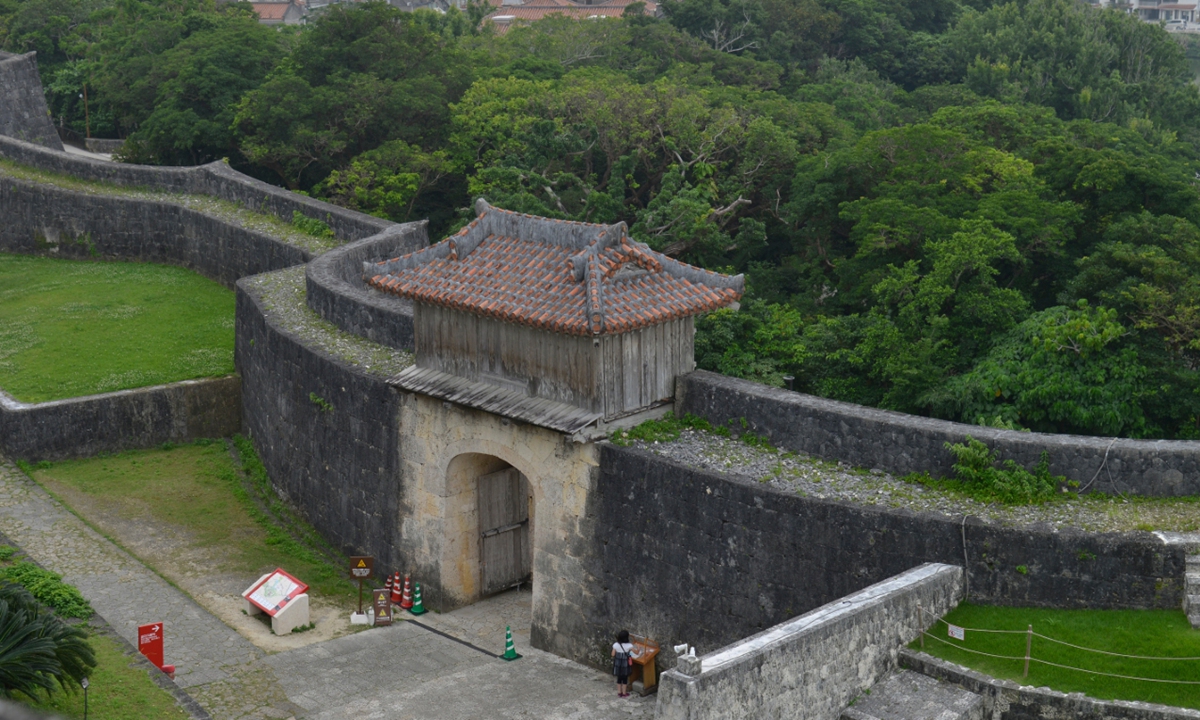
The Shuri Castle in Okinawa Prefecture, Japan, which used to be the palace of the Ryukyu Kingdom Photo: VCG
A new starting pointTo investigate the historical exchanges between the Ryukyu Islands and China, Matayoshi Seikiyo, a professor at the University of the Ryukyus, has also paid more than 10 visits to the Ryukyu Kingdom cemetery.
"Today, I am here again with my compatriots to pay respects to our ancestors. This is what we, as descendants of the Ryukyu people, should do," said Seikiyo. He noted that although he has visited the graveyard many times before, coming to pay respects again after Okinawan Governor Tamaki's visit to China can be seen as a new starting point in history.
During his visit to China in July, Tamaki paid his respects at the site of Ryukyu Kingdom cemetery. In an exclusive interview with the Global Times, Tamaki expressed his desire to continue to maintain the connection created by Ryukyu ancestors and work with China to push forward the ties in a peaceful and prosperous era.
The group from Okinawa first visited Peking University and is scheduled to visit the Museum of the War of Chinese People's Resistance Against Japanese Aggression and other places before departing on Tuesday.
The friendship and cultural exchanges between Okinawa and China that have spanned more than 600 years have continued with increasing people-to-people exchanges. For example, at the beginning of October, the 2023 Okinawa Chinese Music Festival, the first large-scale event of its kind, was held in Okinawa.
While addressing the audiences at the event, Chinese Ambassador to Japan Wu Jianghao said that the performances "not only present traditional and contemporary Chinese art but also feature distinctive Ryukyuan dances and karate performances, which I believe will demonstrate the profound historical ties between Okinawa and China."

